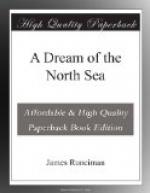Tom remarked, “This is very much like being iced for market. I wonder what we could possibly do, if anything came into us as that barque did? Let’s talk about home.”
“Pleasant indoors now; I can see the fire on the edges of the furniture. The very thought of a hearthrug seems like a heathen luxury. What will you do first when you get home, Tom?”
“Turkish bath.”
“And then?”
“Oysters.”
“Then?”
“Dinner.”
“And after?”
“I’ll spend the whole evening in pretending to myself I’m on the North Sea again, and waking up to find that I’ve got my armchair under me.”
“Can you see anything, Jim, just a point or so abaft the beam.”
This was an ugly interruption to the Barmecides, who had begun to set forth shadowy feasts. That is the way in thick weather; you are no sooner out of one scrape than you blunder into another.
“Yes, sir, she’ll go clear,” sang out the man.
“She won’t, I’m afraid,” said Lewis, under his breath. It was most puzzling; there was no guide; the snow made distances ridiculous, and the black shadow came nearer.
“Up, all of you, and set your fenders. Doctor, show him a flare.”
It was a smack, and her lights had gone wrong somehow; she was moving but slowly, and she let the Mission vessel off with a hole in the mizen. The scrimmage would have meant death had any breeze been blowing; but the men took it coolly after the one dread minute of anxiety was over. If we were all able to imagine our own deaths as possible—to really imagine it, I mean—then one snowy night on the banks would drive any man mad; no brain could stand it. We all know we shall die, but none of us seem to believe it, or else no one would ever go to sea a second time in winter. A steady opiate is at work in each man’s being—blurring his vision of extinction, and thus our seamen go through a certain performance a dozen times over in a winter, and this performance is much like that of a blindfold man driving a Hansom cab from Cornhill to Marble Arch on a Saturday evening during a November fog.




